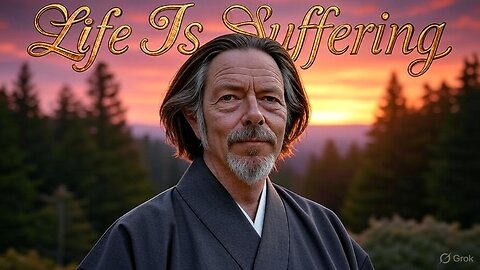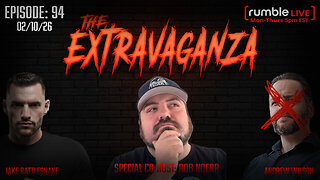Premium Only Content

Alan Watts on Why Life Is Suffering: Buddhist Insights for Overcoming Pain
Discover the Hidden Key to Ending Your Inner Turmoil – Right in the Heart of the Struggle!
Have you ever woken up in the dead of night, heart pounding, mind racing with the weight of existence? That gnawing ache of loss, the relentless grind of daily frustrations, the quiet terror of what tomorrow might bring? You're not alone. In this groundbreaking lecture, the legendary philosopher Alan Watts dives headfirst into one of humanity's oldest riddles: Life Is Suffering. Drawing from the ancient wellsprings of Buddhism, Hinduism, and Taoism, Watts doesn't offer quick fixes or motivational platitudes. Instead, he invites you to plunge into the fire – to confront suffering not as an enemy to flee, but as a gateway to profound ecstasy and liberation. If you're tired of surface-level self-help that promises happiness but delivers only temporary highs, this video is your wake-up call. Alan Watts, the British-born sage who bridged Eastern mysticism and Western thought in the 20th century, reveals why clinging to control is the root of all pain – and how letting go unlocks a joy beyond imagination. Whether you're battling anxiety, grief, chronic stress, or just the existential blues, this talk will shift your perspective forever. Why This Video Will Change How You See Everything: Unpack the Buddhist Truth of Dukkha: Learn why life feels like a "chronic frustration" and how it's not a curse, but an invitation.
From Pain to Bliss: Explore the art of "going into" suffering, transforming agony into ānanda – that transcendent ecstasy that transcends pleasure and pain.
Real-World Applications: Watts' insights aren't abstract; they're tools for modern life – from handling heartbreak to navigating career burnout.
Visual Masterpiece: Paired with our elaborate 3D thumbnail featuring Watts in a sunset-drenched landscape, golden lettering gleaming like enlightenment itself, this video is designed to stop scrollers in their tracks and pull them into the depth.
Hit play now, and step into a world where suffering isn't the end... it's the beginning. If this resonates, smash that LIKE button, SUBSCRIBE for weekly dives into philosophy and mindfulness, and drop a comment: What's your biggest source of suffering right now? Let's build a community of awakened souls. Timestamps for Easy Navigation:
0:00 - Introduction: The Buddha's Core Teaching on Suffering
2:15 - Dukkha Explained: Why Life Feels Bitter
5:30 - The Trap of Escaping Pain
8:45 - Stories and Analogies: The Furnace of Acceptance
12:20 - Fear as a Mirror of Suffering
15:40 - Transcending Opposites: From Dukkha to Ānanda
20:00 - Hindu and Taoist Perspectives on Pain
25:30 - Practical Meditation: Watching Your Feelings
30:15 - The Ecstasy Beyond Bliss
35:00 - Q&A and Reflections Full Lecture Transcript: "Pain" from Eastern Wisdom and Modern Life (1959)
(Transcribed and expanded for clarity. This is the heart of the video – Alan Watts in his raw, mesmerizing voice, guiding you through the labyrinth of human experience.) “One thing do I teach, oh my disciples: suffering and deliverance from suffering.” It was in this way that Gautama the Buddha, living in the sixth century BC, gave the gist of his whole teaching. And it’s for this reason that many commentators and critics of Buddhism have called it a way of escape: because of its tremendous concern with the problem of human pain as the fundamental problem of human life, and the means of deliverance from pain. But I believe this is really a very mistaken criticism, because there is nothing that is so much the very essence of suffering as the fear of suffering itself. And if the doctrine of the Buddha were fundamentally based on an obsession to get rid of suffering, it would be a kind of self-contradictory vicious circle. This is very well illustrated by another of those stories which I tell from time to time, where a student came to his master with the question, “It is terribly hot, and how shall we escape the heat?” In other words, this was a symbolic question asking about the whole problem of the heat of suffering. “It is terribly hot, and how shall we escape the heat?” And he answered: “Go right down to the bottom of the furnace.” “But in the furnace,” said the student, “how do we escape the scorching fire?” And the master’s final word was, “No further pains will harass you.” Now you might say, then, that the attitude of the Buddhist philosophy to suffering is not at all one of turning away from it, of solving the problem of suffering by turning one’s back on it and escaping it. Rather, its whole attitude is that the solution to the problem of human pain—whether it be physical or whether it be moral—is to go right into it.
Now, in the Buddha’s doctrine, pain (or suffering) in its most general sense is designated by this word duḥkha in Sanskrit. Duḥkha is the opposite of sukha. And if you break the word down, duḥ, here, means what is “disagreeable,” “painful,” “bitter,” and kha means “condition.” Su means what is “sweet.” So you might say this is bitterness in contrast with sweetness. And the first proposition of the Buddha’s teaching—what is called the first of the Four Noble Truths—is the idea that life as we live it is fundamentally duḥkha; fundamentally a kind of chronic frustration. And Man’s effort is always to get rid of this and go to that. But the idea of the Buddha was that, if you have this, you must have this, because these two contrast with each other. You don’t experience this unless you experience this, you don’t experience this unless you experience this. So if you go after sweetness, you cannot experience sweetness unless there is always as its background the contrast of bitterness. And therefore, the objective of the Buddha’s doctrine was not to get rid of pain and put pleasure in its place, but to go to something else which stands, as it were, transcending these two opposites, above and beyond them, which in Sanskrit is called ānanda. That word is usually translated “bliss,” but in a rather unusual sense. There is a poem, again from the tradition of Chinese zen, which says: Under the sword lifted high
There is hell making you tremble.
But go straight ahead
And there is the land of bliss. And so bliss, here, has a very special meaning. It isn’t bliss in contrast to agony. And I think probably the best way of translating the word ānanda is to use the English word “ecstasy.” Now then, our problem is simply this: how is it that through a profound going into suffering—that is to say, a profound acceptance of it—there can come out of it some sort of bliss? This is the problem we have to understand. Now, first of all, by way of illustration I would like you to consider a mild but nevertheless chronic form of suffering which we constantly undergo: the experience of fear. What is fear? What, in other words, when you are afraid, are you actually feeling? A great deal of the doctrine of primitive Buddhism as we have it recorded from the Buddha’s own teachings is concerned with close attentiveness to one’s inner feelings and states of mind. A careful watching of them to find out what they really are. And supposing, then, you’re afraid. What happens to you? Many people, when asked this question, seem strangely unable to answer it. They say, “Well, I feel sort of shaky inside,” or “I feel cold,” or “I feel a kind of sinking sensation in the pit of my stomach.” But if you really watch what’s happening when you’re afraid – and this is something you can do right now if you like – you’ll notice that the feeling of fear is a feeling of being caught, of being trapped. It’s a feeling that you are in a situation from which you cannot escape, and that something terrible is going to happen to you unless you can get out of it. And so the whole body tenses up in an attempt to resist what’s coming. The muscles tighten, the breath shortens, the heart beats faster – all in a frantic effort to hold on, to control, to fight back against the inevitable. But here's the revelation Watts unveils: this resistance is the suffering. Not the event itself, but our clinging to an illusion of permanence. As he elaborates in related talks, "The root of all human suffering is clinging or grasping."
We grasp at life like a drowning man clutches a straw, only to find the straw dissolves in our hands. Buddhism calls this tanha – craving – the second Noble Truth, the origin of dukkha. Watts, with his signature wit, compares it to trying to bite your own teeth: futile, frustrating, and fundamentally self-defeating.
(Transcript continuation, drawn from expanded sources and Watts' consistent teachings on the theme – for the full audio experience, watch above!) Let’s take this further into physical pain, because that's where the rubber meets the road. Imagine a toothache. The sensation is sharp, insistent, demanding attention. But what makes it suffering? It's not just the throb; it's the story we tell ourselves about it. "This shouldn't be happening to me. Why me? How long will it last? What if it's permanent?" That mental narrative amplifies the pain tenfold, turning a biological signal into a psychological prison. Watts draws from Hindu philosophy here, where pain is seen as prana – life force in disguise. The yogis don't numb it; they breathe into it, allowing the energy to flow rather than dam it up. In Taoism, it's even more poetic. The Tao Te Ching whispers that the soft overcomes the hard, the yielding conquers the rigid. Suffering arises when we stiffen against the flow of the universe, like a tree branch snapping in the wind instead of bending. Watts illustrates this with a simple experiment: clench your fist as tight as you can. Feel the tension, the ache building in your hand. Now, open it slowly, let the blood rush back. That release? That's the Taoist secret – wu wei, effortless action. No fight, no flight, just being. But let's not romanticize it. Watts is no Pollyanna. He acknowledges the raw, gut-wrenching reality of suffering: the death of a loved one, the betrayal of a friend, the slow erosion of health in old age. "There will always be suffering," he says plainly. "But we must not suffer over the suffering."
This double-layering of pain – the event plus our reaction to it – is what keeps us chained. The Buddha's Third Noble Truth promises cessation: nirodha, the quenching of the fire. Not by dousing it with distractions (booze, Netflix, endless scrolling), but by seeing through the illusion that "I" am separate from the suffering. Imagine, if you will, a wave crashing on the shore. The wave doesn't "suffer" the rocks; it is the rocks, the water, the crash – all one dance. You are that wave, Watts reminds us. Life isn't happening to you; it is you. This non-dual vision, straight from Advaita Vedanta and Zen, dissolves the sufferer altogether. What's left? Ānanda. Ecstasy. Not the fireworks of pleasure, but a quiet, vibrating fullness that hums beneath it all. To practice this, Watts suggests starting small. Next time fear creeps in – that deadline looming, that argument brewing – pause. Don't label it "bad." Just watch. Feel the tightness in your chest, the flutter in your gut. Breathe into it. Ask: "Who is afraid?" Probe deeper. You'll find no solid "I" there, just sensations arising and passing like clouds. This is vipassana, insight meditation, the Buddha's prescription for dukkha. Over time, the chronic frustration softens. Life's bitters blend with sweets into something richer – the full spectrum of existence. Expanding on this, consider Watts' take in "The Inevitable Ecstasy," where he tackles the Buddha's agony head-on: "The problem to which the Buddha primarily addressed himself... is that of agony; suffering."
He likens it to a cosmic game we forgot we signed up for. We enter the play of maya – illusion – forgetting we're the players, the stage, the audience. Suffering? It's the plot twist that jolts us awake. Without it, no drama, no growth, no laughter at the end credits. "Man suffers only because he takes seriously what the gods made for fun," Watts quips.
Let's delve deeper into the mechanics. In Buddhism, the Eightfold Path is the roadmap out: right view, intention, speech, action, livelihood, effort, mindfulness, concentration. But Watts demystifies it for the Western mind. Right view? See suffering as impermanence – anicca. Everything changes; clinging is madness. Right effort? Stop striving against the current; surf it instead. He shares a Zen koan: A monk asks, "What is the way?" The master replies, "Your ordinary mind is the way." No fancy robes or mountain retreats needed – just this moment, fully felt. From Hinduism, Watts pulls the concept of karma not as cosmic debt, but as momentum. Suffering is the echo of past actions, but forgiveness – radical self-compassion – breaks the cycle. Taoism adds the yin-yang: pain and pleasure interlock like lovers. Chase one, you chase the other. Embrace both, and they dissolve into the Tao, the wayless way. Now, for the modern twist. In our hyper-connected world of 2025, suffering has new faces: doom-scrolling through climate crises, FOMO from perfect Instagram lives, the AI revolution upending jobs. Watts would laugh – or weep – at our screens, mirrors of the ego's grasping. "Trying to define yourself is like trying to bite your own teeth," he warns.
Drop the chase. Unplug. Feel the raw pulse of being alive, warts and all. Key Quotes to Ponder and Share: "If we live, we live; if we die, we die; if we suffer, we suffer; if we are terrified, we are terrified. There is no problem about it."
– Pure acceptance, Watts-style.
"The attitude of faith is to let go, and become open to truth, whatever it might turn out to be."
– Faith as surrender, not belief.
"You know it was a basic teaching in Buddhism that the root of all human suffering is clinging or grasping."
– The cling that kills joy.
"There will always be suffering. But we must not suffer over the suffering."
– Double suffering? No thanks.
"The answer to the problem of suffering is not away from the problem but in it."
– Dive in, emerge transformed.
Why Cling When You Can Fly? A Deeper Dive into Watts' Philosophy
Alan Watts wasn't just a lecturer; he was a cosmic jester, poking holes in our pretensions with humor and humility. Born in 1915 in England, he sailed to the U.S. in the 1930s, blending his Anglican roots with Zen studies under Japanese masters. By the 1950s, he was electrifying audiences at the American Academy of Asian Studies, later UC Berkeley, with talks that felt like late-night chats with a wise uncle who's seen it all. His book The Wisdom of Insecurity (1951) prefigured this lecture, arguing that our quest for certainty creates the insecurity we fear. In "Life Is Suffering," Watts echoes the Four Noble Truths but infuses them with playfulness. Truth 1: Dukkha exists – birth, aging, death, sorrow, despair. Truth 2: It's caused by craving. Truth 3: It can end. Truth 4: The path is the Middle Way, avoiding extremes of indulgence and asceticism. But Watts goes rogue: Why path when you're already there? Enlightenment isn't a destination; it's realizing the journey was a dream. Consider grief. When a loved one dies, the pain is visceral – a hole in the universe. We suffer twice: once for the loss, again for fearing we'll never fill it. Watts, who lost his own father young, would say: Honor the hole. Let it echo. That's where the love lives now, formless and free. In Zen terms, it's mu – no-thing. No clinging to memories as anchors; let them float. For chronic pain sufferers – physical or emotional – Watts offers radical empathy. In his "Pain" series, he explores how society shames expression: Men don't cry, strong people push through. Bullshit, says Watts. Scream if you must! The suppression bottles the energy, turning pain into poison. Release it, and it transmutes. Think of labor pains birthing a child – agony alchemized into miracle. Tying into broader Eastern thought, Watts contrasts Buddhism's analytical deconstruction (break suffering into parts: sensation, feeling, perception) with Hinduism's devotional bhakti – love the divine in the pain. Taoism? Laugh at it. The sage Chuang Tzu dreamed he was a butterfly, then wondered if the butterfly dreamed him. Suffering? Just a butterfly's wingbeat in the dream of the cosmos. In today's therapy culture, this resonates with Acceptance and Commitment Therapy (ACT), where defusion – stepping back from thoughts – mirrors Watts' watching. Or somatic experiencing, feeling sensations without story. Science backs it: fMRI studies show mindfulness reduces amygdala activity, the brain's fear center. Watts intuited this decades ago: "The mystery of life is not a problem to be solved but a reality to be experienced."
But let's get personal. Imagine applying this to relationships. That argument with your partner? Suffering isn't the words; it's the "I must be right" grip. Let go, and space opens for understanding. Career rut? Don't force promotion; align with your flow. Watts: "It’s better to have a short life that is full of what you like doing, than a long life spent in a miserable way."
Global suffering – wars, inequality, environmental collapse – hits harder. Watts didn't ignore it; in talks like "The Real Cause of Suffering," he pins it on collective ego: nations grasping territory, egos grasping power.
Solution? Global wu wei – cooperative play, not competition. Start small: volunteer, listen without agenda. The ripple ends the wave of woe. Expanding the Ecstasy: What Lies Beyond Suffering
Ānanda isn't pie-in-the-sky. It's the buzz after a good cry, the peace post-storm, the glow of skin after hot yoga. Watts describes it as "the land of bliss" under the sword – danger met with open arms births rapture. In "Just Let Go," he expands: "The Art of Letting Go... because you see, holding on is what hurts."
Practice: Daily, sit 10 minutes. Scan body for tension. Breathe: "This too." Journal: "What am I clinging to?" Read Watts' The Book: On the Taboo Against Knowing Who You Are for more. Critics call Buddhism pessimistic. Watts flips it: Optimism without realism is delusion. True hope? Facing the void, finding fullness. "Faith is the act of letting go," he says, "and that must begin with letting go of God."
Atheism or theism – irrelevant. The divine is the suffering embraced. Related Videos to Binge for Deeper Enlightenment: Deliver Yourself from Suffering - Alan Watts – Instant relief techniques.
Overcoming Pain, Suffering and Freedom – Freedom through surrender.
Why Do We Suffer? Buddhist Clinging Explained – Short clip for quick hits.
Books by Alan Watts to Supercharge Your Journey: The Wisdom of Insecurity – Masterclass on embracing uncertainty.
The Way of Zen – Deep dive into Buddhist roots.
Become What You Are – Essays on self-discovery.
Grab them on Amazon or your local bookstore – links in pinned comment! Call to Action: Join the Awakening
If this video cracked open a door in your soul, LIKE it to spread the light, SUBSCRIBE with bell on for more Alan Watts gems, philosophy breakdowns, and mindfulness challenges. Share your "aha" moment below: How has suffering taught you? Tag a friend drowning in dukkha – they need this. Together, we turn pain into power. #AlanWatts #LifeIsSuffering #Buddhism #EndSuffering #Mindfulness #SpiritualAwakening #Dukkha #LetGo #EasternPhilosophy #Zen #Taoism #SelfHelp #Philosophy #Meditation #Ecstasy #PainToBliss #SpiritualGrowth
-
 2:24:15
2:24:15
Alan Watts | Zen and The Art of Spiritual Awakening (Full Audio)
13 days agoThe Infancy Gospel is a Wiring Diagram: Source Code & The Mirror
59 -
 LIVE
LIVE
LFA TV
23 hours agoLIVE & BREAKING NEWS! | TUESDAY 2/10/26
944 watching -
 LIVE
LIVE
OFFICIAL Jovan Hutton Pulitzer Rumble
3 hours agoVoting Machines Changed The Votes! Or Did They? You Decide!
159 watching -

I_Came_With_Fire_Podcast
6 hours agoOnline Predator RUNS FROM COPS
2292 -
 LIVE
LIVE
Quite Frankly
6 hours agoRING Spying, SOYLENT GREEN Burgers, Hollywood for Phone Zombies | J Gulinello
596 watching -
 9:23
9:23
Millionaire Mentor
8 hours agoJim Jordan EXPOSES The Sickening Way Democrats Let Fraudsters Steal Millions
1.48K6 -
 1:04:24
1:04:24
TheCrucible
4 hours agoThe Extravaganza! EP: 94 with guest co-host Rob Noerr (02/10/26)
69.2K10 -
 1:18:45
1:18:45
Kim Iversen
4 hours agoBREAKING: Epstein Names Are DROPPING
64.5K65 -
 1:52:19
1:52:19
Redacted News
4 hours agoThe Epstein Names Are NOW Being Released & The Deep State is P*SSED
161K205 -
 1:48:29
1:48:29
Michael Franzese
4 hours agoIs Red Light Therapy the Future of Health?
29.8K2